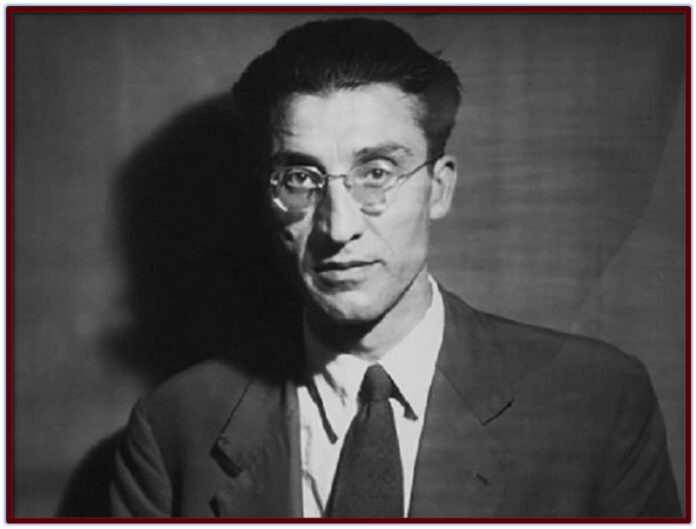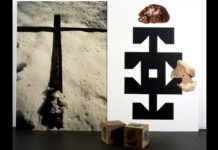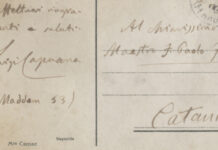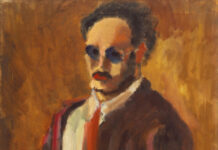“I mari del Sud”. Some notes, on the occasion of poet’s 70th anniversary of his death
Seventy years have passed since the death of Cesare Pavese. Then he advised not to gossip. Today it would be easier to enter the fence of chatter. However, remembering Pavese, as Pavese would have liked, exempts us from facing problems that, after all, are outside Pavese. Those which are inside, are verses, words, and with these, thus recalling Saint Augustine, facts. And it was precisely the facts that acted both on his existence, and on his death. An incontrovertible fact is in the words that reveal him, those dissolved among the amniotic waters of the South Seas.
***
In creative secretions, as well as in many statements of poetics, Cesare Pavese (1908-1950) passes on that predominantly organic part of his ideal matter. An emergence, after all, of his most archaic biological drive, which Pavese makes manifest by elaborating on his sheets a sudden luminous circle, a shiny omen, a dazzle around the words pushed all the way into the narrative fabric. It traces the cocoon of that existence, which is subtly unfolding, grasped, rather than out of alert awareness, almost by instinct. Then the processing of real, objective data takes shape. They are quickly placed in synergy with the expansion of a spiritual urgency, capable of collecting, in its entirety, such vital parameters and making the most proper use of them. We are therefore witnessing the assumption of a kind of fuel necessary to start, if not to continue, the game of existence, immediately felt in all its roughness, in all its naturalistic rigor. This scenario is expressed, with vivid clarity, in Lavorare Stanca, then in the posthumous diary Il mestiere di vivere. In this last one, the writer noted, on 15 October 1935, about the “new atmosphere” perceived around his poetry, as it should be: “to transform the material and the means in order to be faced with new problems.” Moreover, he concluded, “having had the starting point, it is understood that the spirit will resume all its play.” The mood of such thought seems to rotate on three words: ‘matter’, ‘spirit’, and ‘play’. In many respects they avail themselves in the text I mari del Sud. In fact, it emerges a wandering dragging force, nothing but the matter of the sleepy life, gathered in its coming forward. Massimo Mila, in preface to Poesie, recalling the “band of alumni of Augusto Monti” and the rankings that then, boys, operated (“equal merit”) for those pieces with a sweet confessional taste, states:
[…]
When Pavese read us I mari del Sud, nothing but tie! We were young then, and among us were those who seriously asked for Homer’s name. The phase of individual confession was overcome with momentum, reaching the opposite end of a narrative object, in which poetry populated with characters, countries and figures: poetry of epic dimension, therefore.
Pavese, also in the dialytic segment of 15 October, reiterates that before the writing of I mari del Sud he felt “lost”. He declared with obvious emotion: ” I started to know my world as I created it. Not before.” I mari del Sud, incipit of “Lavorare stanca” in the section ‘Antenati’, dedicated to Augusto Monti (his master at the Turin High School ‘Massimo D’Azeglio’, the collaborator of Giuseppe Lombardo Radice, Gaetano Salvemini, Piero Gobetti, and author of I Sansôssí (“The Carefree“), occupies an ideal position for his immediate expressive tests, a manifesto of evident aesthetic importance. Poetry appears to be crossed, in the alternation of the lasses, by a body empathy reflected by troubled spiritual display cases, and, at the same time, dressed in a slight contemplative stocking, lowered into a realistic grid. Here the following themes have been portraited: detachment, nostalgia, emigration, the land of belonging, the peasant civilization where “silence” becomes “virtue”, and from which every folkloric pigment has been excised (it does not sprout, here, the anthropological vitalism of I mé by a Davide Lajolo). In some respects, this penalty of doing, of softening, is revealed in the marking of the works. in note to I Mari del Sud, Italo Calvino emphasizes how evident is that “first very troubled little one”, when we see the word ‘instinctive’ take over, at a time when the poet is looking for his own verse and destiny as a writer.
He seems to want to derive from it a sketchy, but already truthful, model of his own formation, of the way in which to read and interpret the features of life. Also, he wants to derive a model of the way in which to achieve, after translations of North American writers, and after his Whitmanian reflection (one evaluates the tangencies with Leaves of Grass; 1855), the (dramatic) outcome of the problems, savoring them, since their genesis, in their mythography, immersing themselves with the word (and touch) in a primary laryngeal vocation. In this regard, in fact, he declares: “I used my poetry moaning”; a moan, a song, a lamentation, perhaps, to attempt the landing on the platform of a personal honest and objective dimension of poetry-storytelling. This kind of poetry, deprived of any rhetorical ignition, however, hatches, in the light of the eyes made greedy by the desire to intercept the events of life, the essential and daily material, observing and contemplating what Pavese calls “the true development of cases”. From this platform, then, it is possible to access a Hegelian Bildung in order to – recalls Pavese – “debunk the Leopardian-Nietzschian myth that active life is superior to contemplative one.” Moreover, Antonio Sichera also observes that through that platform is possible to initiate “the exclusion of banausía – that is, of any form of manual work-” in the manner codified by the Greeks who believe that contemplation exercises its dominance over action. It is Massimo Mila, Pavese’s friend and music critic, who reiterates how the “Celtic substrate of epic-narrative poetry” found in the I mari del Sud, “with all that behavior of combative evasion towards a dreamy earthly paradise […] the fathers of our twenty years’” represents the first indisputable justification for that difficult ‘profession’ that is life.
That is to say that those verses represented the basis and future melancholy obsession, a poignant vital trade, which belonged to a desired world, already devoted to the end, in which the éthnos signaled without overdoing, with expressionistic vigor, labor and decline of agropastoral civilization, epochal disturbances of the West. Pavese reiterates, over and above fears about the future creative torpor of the West, that the spirit and creativity of the old Europe imperturbably “are carrying out that secret metabolic work which is to give them new tissues and new health”. On the labor of memory, precisely in those years, Cioran, writing to Costantin Noica words pervaded by a sore dialectical vein, states: “I would give all the landscapes of the world for those of my childhood. One thing I must add: that it seems to me a paradise, depends only on the illusions and weaknesses of memory.” Invited to remember, and not abandon his mother tongue, the Romanian writer regrets in synesthesia “the smell of fresh and rotten, that mixture of sun and mud.” It is still something abundantly settled between the wounds of the native language. In this Pavese (as later Pasolini) contrasts the naïve parodic scaffolding of “Sotadic versification” [to the licentious measure of Sòtade, poet of Maronea] of the first poetic experiences, with the “transpositions”, the “links of spoken, technical and dialectal use”, allowing, as he himself declares, to make “blood run and live life”. This blood is embodied in poetry, making it life. Moreover, even with frank roughness, through those “grafts” of the language of use and dialect, it is possible to affirm the pragmatic and ideal need for maternal locutio, understood as consistency and language of poetry, according to a well-known statement by Virgilio Giotti.
The poetic exercise, therefore, detached from experience has no place for Pavese. Practicing life through the palpability of facts means allowing life itself to breathe at full lungs. Without this possibility the practice of poetry turns into an anemic, sterile, and vacuous exercise. In this regard, the poet clarifies: ‘Since I imagine that no research of mine can be lost’, it is clear that ‘progress consists of an increasingly sympathetic grinding of experiences, throwing the new on the old’. The relationship with active knowledge assumes value if, as we think we learn, it is properly shredded, rendered in mash. Only then can the knowledge be assumed in all its material and profound value. Then it will have to be accumulated, layered, and compacted in order to mutate into vital matter, to bind itself into an earthly communion (while: in gremium matris terrae praecipitavit). A knowing and experimenting which aim at showing, through poetic action, the passionate mood, the wind of words ready to shake desires and feelings; at conceiving that essential filter for days pervaded by men, women, words, deeds, discouragements. In front of the reality of facts, there is a kind of primary consciousness of poetry, a perceptual naïveté linked to the geological and sociological value of the territory (Piedmont and its Langhe, for Pavese). It allows the take-up of that “first foundation of poetry” designed to recognize, in a hermeneutic sense, an original intuition (the Heideggerian “pre-comprehension”) precisely because of the inclination to immerse itself, as Pavese insists, in the “dark awareness of relations, biological ones perhaps, which already live a larval life of image in the pre-poetic consciousness.”
Immediately, an extensibility from the post-academic versification of I mari del Sud can be grasped from the exotic suggestion of the title (as opposed to the objective compactness of the text) of vague Salgarian vibes, probably fed by the readings pursued, with “emphasis”, since he was a child and not subtly in the “Profession of poet.” Therefore, we would record a new breath with a eurhythmic trend suitable to pervade the verses, articulate the lasses and thus give readers back a poetic story. All of this is poetry, in which the dimension of the inner conversation emerges, as well as the epigrammatic value of ‘death’, ‘time’ and ‘village’ of an Edgar Lee Masters, early discovered by Pavese. What about the amazement that rises between the existences, almost falling asleep, often ironizing with the bitterness of the game? Playing, precisely, with life and death, with boyish taste, like the greetings “card” that reached “the father already dead” and that brings readers back to the ironic bitterness of the Sicilian Vann’Antò in “Cartullina.” This is certainly more dramatic, but with intact and intense aftertaste of bitter almonds: “Cci mannarru and the cartullina / a n-surdatu muortu». Words that have the same hardness as stones, a perennial part of the wasteland and dignified, fragile, powerful and already dedicated to death body of characters. The same death can be found in the Spoon River by Masters, the same “end of time” which constitutes, in Pavese’s words, “the decisive moment which detached one from the forest of personal symbols”; and did so “with violence, and he welded it, nailed it forever to the soul.” Poetry absorbed, in its decisive semantic areas, that “ternary rhythm”, as Mila had defined, which, clearing it from the hendecasyllable, and from its role as an individual if not lawful confession, enshrines that monodic oscillator “of three syllables in three syllables, to which the simple addition of one foot takes away all the snappy mechanics of the decasyllabic”.
Pavese’s verse is therefore expressed in the dignity of melancholy, with not exasperated passion, but no less tormenting. This is inherent in his rhythm, precisely, in that dry-sided groan, in that Pavese’s “moaning”, which is used to say subtly of a fact, of a pain, of a life spent and suffered, of a constant relationship with the earth, with the place on which to shed one’s tears, to free the pulse of one’s heart in the carnal and sentimental mixture (in the airy version of ‘feeling’, delivered to us by Giovanni Comisso, as “cerebral perception of a wind”). Then it is said, along the hill climb of souls, including the one of the poet, linked to the mark of a land that, seen in perspective and at a distance, appears even more ardent: “We walk one evening on the side of a hill”; “my cousin is a giant dressed in white, / moving calmly, tanned in the face”; “with the collected gaze I have seen, child”; “The city has taught me endless fears”; “it was said that the day was old for them.” The Pavese’s verse is offered in a painful ternary, telling readers about the realization of memory in an antipoetic figure (the cousin), and, perhaps for this reason, dramatically and poetically human. In these verses, the same language, with which it slowly expresses itself, “the dialect” (not reported as writing, but acoustically felt) is “like the stones” of the hill, “so scabrous / that twenty years of idioms and different oceans / have not scratched it.”
Finally, the whole ellipse of life and passions spreads, in the tear of violence, right at the end of the poem, between crampons launched by the Cetaceans, the “Dutch fishing wood”, and the fierce pursuit with deadly lifeboats. These same crampons injure animals, men and souls in order to shine, sheathed by the sun, on that precise day that, just arose, already knows the purple color of the evening.








